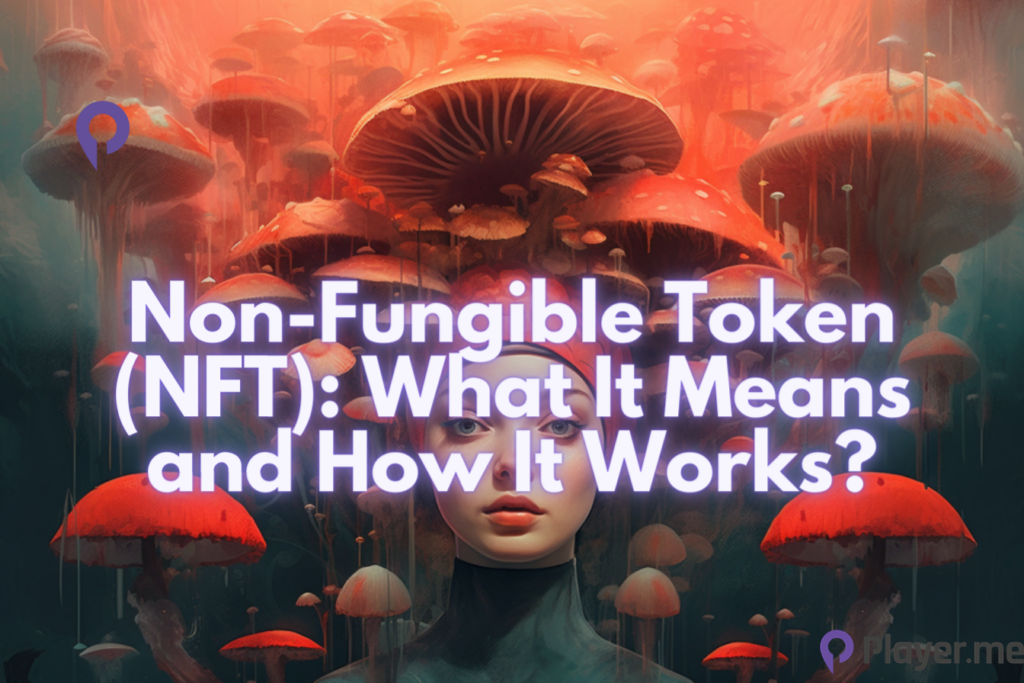Non-fungible tokens (NFTs) have become a buzzword in the cryptocurrency world, revolutionising how we perceive and trade digital assets. In this article, we will delve into the concept of NFTs, exploring what they are, how they work, and their impact on various industries.
Also read: 10 Cheap Cryptocurrencies to Buy 2023
Understanding Non-Fungible Tokens: Defining Non-Fungible Tokens
Non-fungible tokens (NFTs) are unique digital assets representing ownership or proof of authenticity for a specific item or piece of content. Unlike cryptocurrencies such as Bitcoin or Ethereum, NFTs cannot be exchanged on a one-to-one basis due to their uniqueness.
How NFTs Work?
NFTs leverage blockchain technology to create a digital ledger that verifies and records a particular asset’s ownership and transaction history. This immutable nature ensures the scarcity, provenance, and uniqueness of each NFT, making it a valuable digital collectible or asset.
Here’s how they work:
Blockchain Infrastructure
NFTs are built on blockchain networks like Ethereum, Binance Smart Chain, or Flow. These decentralised networks provide the infrastructure for creating, buying, selling, and trading NFTs securely. Ethereum’s ERC-721 and ERC-1155 token standards are widely used for NFT creation and compatibility.
Token Creation and Minting
Artists, creators, or developers can mint NFTs by associating unique metadata with a token, such as title, description, and digital content. This process establishes the uniqueness and scarcity of the NFT. Minting is often accompanied by a smart contract that governs the ownership and transactional rules for the NFT.
Ownership and Transfer
NFT ownership is verified and transferred through the blockchain. Ownership can be bought, sold, or traded using cryptocurrencies, and each transfer is recorded on the blockchain, providing a transparent and traceable history. Smart contracts facilitate the execution of transactions and ensure secure ownership transfers.
NFTs and Their Impact

The NFT boom has seen the value of the industry spiral to the heavens. Digital collections have been sold for millions of dollars, and there’s a scramble to acquire NFTs for various purposes.
Digital Art and Collectibles
More than any other industry, NFTs have disrupted the art world by enabling artists to tokenise and sell digital artwork directly to collectors, bypassing intermediaries. Artists can receive royalties whenever their NFTs are resold, creating a new revenue stream. Additionally, NFTs offer provenance and authenticity verification for digital art.
Gaming and Virtual Assets
NFTs have found extensive use in gaming, allowing players to own and trade in-game items, characters, and virtual real estate. This gives players true ownership and the ability to monetise their virtual assets outside of the game environment.
Intellectual Property and Licensing
NFTs offer a solution for creators to protect and monetise their intellectual property. They enable content creators, musicians, writers, and filmmakers to sell limited editions, rights, or licences as NFTs, ensuring traceability and authenticity.
The Future of NFTs

NFTs are still a relatively new technology, but they have the potential to revolutionise the way we own and interact with digital assets. As the technology continues to develop, we can expect to see NFTs being used in a wider variety of applications. Here are some of the potential benefits of NFTs:
Increased Security
NFTs are stored on the blockchain, which is a secure and tamper-proof ledger. This means that NFTs are less likely to be lost or stolen than traditional digital assets.
Increased Transparency
The blockchain is a public ledger, meaning anyone can verify an NFT’s ownership. This can help to reduce fraud and scams.
Increased Liquidity
NFTs can be bought and sold on various exchanges, making them more liquid than traditional digital assets. This means that buying and selling NFTs is easier, making them more attractive to investors.
Conclusion
Non-fungible tokens (NFTs) have opened up new possibilities for ownership and trading of digital assets.
NFTs offer provenance, scarcity, and authenticity in the digital realm. Whether in the art world, gaming, or intellectual property, NFTs have the potential to transform various industries by empowering creators, providing new revenue streams, and giving individuals true ownership of their digital assets. As the technology continues to evolve, stakeholders must understand the potential and implications of NFTs to leverage their benefits effectively.
Frequently Asked Questions
How Do NFTs Derive Their Value If They Can Be Easily Replicated?
While the digital files associated with NFTs can be easily copied, the ownership and provenance recorded on the blockchain give NFTs their value. The blockchain acts as an irrefutable ledger that verifies the authenticity and ownership of an NFT, making it a unique and scarce digital asset. This ensures that each NFT has a distinct value in the market, similar to physical collectibles or unique works of art.
Are NFTs Only Limited to Artwork and Digital Collectibles?
No, NFTs extend beyond the artwork and digital collectibles. While they gained prominence in art, NFTs have expanded into various domains. They are used in gaming for virtual assets, enabling players to own and trade in-game items and characters.
NFTs also have applications in the music industry, allowing artists to sell limited editions or unique experiences. Additionally, NFTs can represent ownership of real-world assets like real estate, luxury goods, or even intellectual property rights.
Can NFTs Be Sold or Traded on Any Platform?
NFTs can be bought, sold, and traded on various platforms that support their specific blockchain infrastructure. Ethereum-based NFTs, for example, can be traded on popular platforms like OpenSea, Rarible, or SuperRare.
Different blockchains have their own marketplaces and platforms dedicated to NFT trading. It’s essential to ensure that the platform you use is reputable and secure, as the NFT market is still evolving and requires caution when engaging in transactions.





